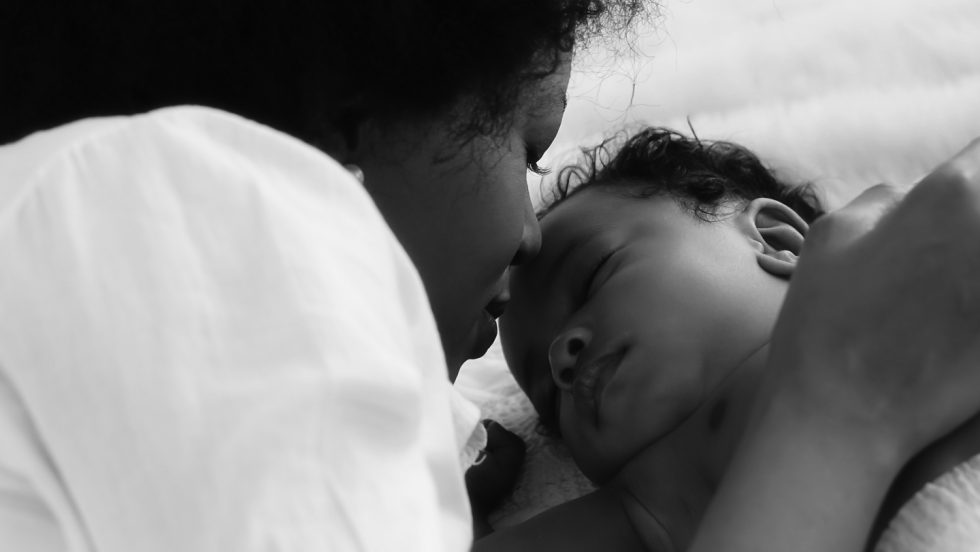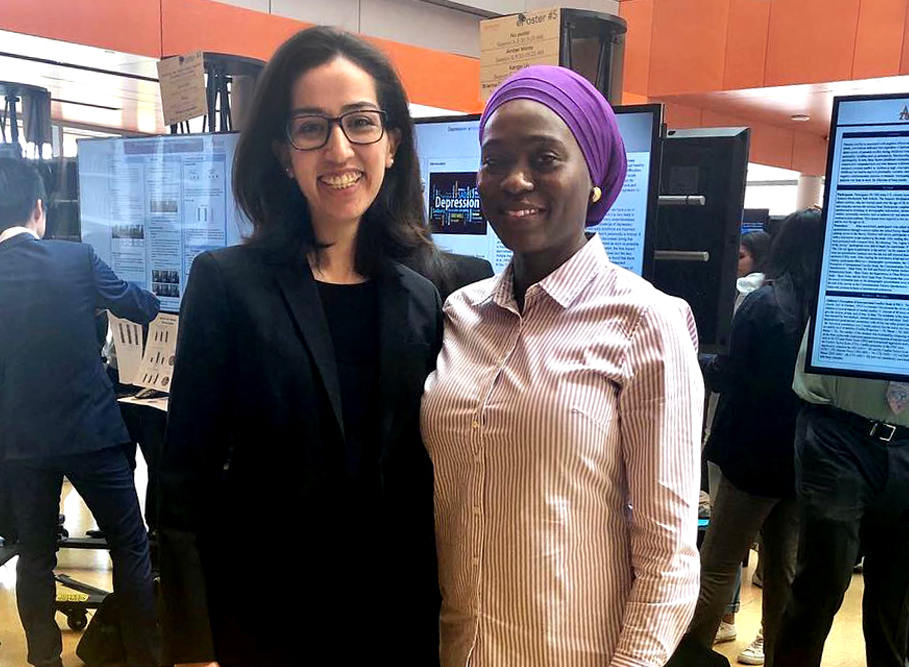
Illuminating COVID's toll on African American mothers and children.

Korede Yusuf, PhD, is an assistant professor in the College of Nursing and Public Health. Her scholarly research is aimed at addressing maternal and child health inequalities.
As the COVID-19 pandemic gained force last spring, Korede Yusuf, PhD, assistant professor in the Adelphi College of Nursing and Public Health, and her research team decided to turn their attention to the crisis.
Research team members from Adelphi, Baylor College of Medicine and Texas Tech University Health Sciences Center began to focus closely on COVID-19’s impact on the health of African American women and families, who already suffer disproportionately poor health outcomes. “We all have an interest in maternal and child health [MCH],” Dr. Yusuf said, “so it was natural to examine these MCH issues as they relate to the pandemic.”
In September 2020, the team published a collection of five related works in the International Journal of Maternal and Child Health and AIDS. Dr. Yusuf was the lead author of “Expected Surge in Maternal Mortality and Severe Morbidity among African-Americans in the Era of COVID-19 Pandemic.”
Risks for African American mothers surged early in the pandemic
Prior to the pandemic, African American mothers were three times as likely to die from pregnancy-related causes than white mothers. With this disparity in mind, Dr. Yusuf and her colleagues sought to create a theoretical framework to delineate the contributing factors around the expected rise in maternal mortality and severe maternal morbidity (severe pregnancy complications that can cause serious consequences for a woman’s health) due to COVID-19.
While little had been published on COVID-19’s effects on African American mothers at that point, Dr. Yusuf and her team found six articles that helped them identify the proximal (direct) determinants and distal (indirect) determinants leading to increased maternal morbidity and mortality. Proximal determinants included lower insurance coverage, reduced access to or utilization of reproductive and maternal health services, and an increase in the prevalence of chronic health conditions (such as diabetes, hypertension and obesity), while distal determinants included higher unemployment, heightened fear of the virus, travel difficulty and shelter-in-place restrictions.
Notably, their research reveals that the disparities between African American and white women took hold early in the pandemic. Between April and May of 2020, the unemployment rate rose from 16.4 percent to 16.5 percent for African American women but decreased from 15 percent to 13.1 percent for white women. This meant that African Americans were losing health insurance and the ability to pay for healthcare on a large scale.
Other socioeconomic issues figure into the equation as well. As Dr. Yusuf notes, 19 percent of African American households do not own a car, compared to only 4.6 percent of white households. The greater reliance on public transportation by African American women could lead to their underutilization of healthcare services during COVID-19, including crucial prenatal and postpartum doctor visits.
Dr. Yusuf and her team also considered the findings of a recent study that concluded that 31 percent of the general increase in maternal mortality can be attributed to obesity, while 17 percent is linked to diabetes and about 5 percent linked to fewer than 10 prenatal healthcare visits. African American women are already at higher risk for obesity, Dr. Yusuf points out, which makes them more susceptible to developing conditions like diabetes and hypertension. Longer stay-at-home orders could result in significant weight gain, compounding the overall health risk for African American women.
Together, these factors led Dr. Yusuf’s team to predict a widening of the existing maternal health disparities for African American women during the COVID-19 pandemic. To close the gap in health outcomes, they recommend intensifying advocacy for at-risk populations, implementing culturally acceptable intervention programs, and formulating policies to address the underlying problems causing health disparities. Yet, even with the pandemic’s end in sight, there is still much work to be done. “We’re hoping that within a year or thereabouts, we’ll begin to see data that we can use to test our hypothesis and see whether trends have changed,” Dr. Yusuf said.
COVID-19 takes a heavy mental toll on African American families
Another article in the International Journal of Maternal and Child Health and AIDS by Dr. Yusuf and her colleagues, “COVID-19 Devastation of African American Families: Impact on Mental Health and the Consequence of Systemic Racism,” explores a different dimension of the pandemic’s impact on the African American community. Its lead author is Sahra Ibrahimi, who received her Master of Public Health from Adelphi in 2020.

Dr. Yusuf and co-author Sahra Ibrahimi, MPH ‘2.
“When I started at the College of Nursing and Public Health, I was interested in maternal and child health research,” said Ibrahimi, who won Adelphi’s Outstanding Graduate Student Award in 2019. “My adviser introduced me to Dr. Yusuf, whose specialty is maternal and child health. I started working with Dr. Yusuf in my first year, even before taking any classes with her at Adelphi.”
For “COVID-19 Devastation of African American Families,” Ibrahimi proposed the idea of applying the social-ecological model (SEM)—which examines the complex interplay among various personal and environmental factors—to portray inequities induced by systemic racism.
The authors’ literature review demonstrates that “COVID-19 disproportionately impacts African American families and their mental health due to systemic racism, which intensifies the adverse effects of the social determinants of mental health.”
While this study is the first to delineate the inequities caused by systemic racism and its wide-ranging effects on the mental health of African American families during COVID-19, Ibrahimi is hopeful that it will be far from the last. “I hope this piece encourages the public, especially policy makers and public health program implementers, to design interventions tailored to and adapted for local contexts and community characteristics instead of standard generic interventions,” she said.
A long-term focus on correcting health disparities
Outside of her multi-university research effort, Dr. Yusuf is continuing to study the health of underserved populations, particularly as it relates to motherhood and health disparities. She is the lead author of “Impact of Maternal Age on the Foreign-Born Paradox,” published in February 2021 in the Journal of Immigrant and Minority Health. The study supports the existence of the “foreign-born paradox,” in which foreign-born women experience better maternal health outcomes than American-born women. “You would expect that women coming here from developing nations would have lower levels of maternal health, but it isn’t true,” Dr. Yusuf said. “An immigrant from Nigeria, for example, is likely to have a much better maternal health outcome than an African American woman.”
The results of her research were consistent for different racial groups, which means that a Mexican immigrant woman generally has a better maternal health outcome than a Hispanic American woman. Dr. Yusuf and her colleagues discovered one lone distinction, however: age. Immigrant women of all ages generally have better health outcomes, except for those under 20. “We’re not exactly sure why,” she said. “My suspicion is that if you’re a teenage mother who immigrated from another country, then you probably came here as a child. You’re more American than an older immigrant who spent a significant part of her life growing up in another country.”
People have been talking a lot about the impact of the pandemic on Americans in general, but nobody knows what’s going on with this particular group.
Now, Dr. Yusuf and a colleague, Ednah Madu, PhD ’18, assistant professor in Adelphi’s College of Nursing and Public Health, who are both from Nigeria, are collecting data for a new study that explores the effects of COVID-19 on the mental and physical health of African immigrants. They’re currently reaching out to community-based and religious organizations to which African immigrants belong in order to recruit study participants. “This is the research I’m most excited about right now,” Dr. Yusuf said. “People have been talking a lot about the impact of the pandemic on Americans in general, but nobody knows what’s going on with this particular group. Maybe they’re fine; maybe they’re not fine. We don’t know, but we hope to find out.”
Yusuf, Korede, and Deepa Dongarwar, Sahra Ibrahimi, et al. “Expected Surge in Maternal Mortality and Severe Morbidity among African-Americans in the Era of COVID-19 Pandemic.” International Journal of Maternal and Child Health and AIDS, vol. 9, iss. 3, 16 Sept. 2020, pp. 386-389.
Ibrahimi, Sahra, and Korede K. Yusuf, Deepa Dongarwar, Sitratullah Olawunmi Maiyegun, Chioma Ikedionwu and Hamisu M. Salihu. “COVID-19 Devastation of African American Families: Impact on Mental Health and the Consequence of Systemic Racism.” International Journal of Maternal and Child Health and AIDS, vol. 9, iss. 3, 16 Sept. 2020, pp. 390-393.
Yusuf, Korede, and Deepa Dongarwar, Sitratullah O. Maiyegun, Chioma Ikedionwu, Sahra Ibrahimi and Hamisu M. Salihu. “Impact of Maternal Age on the Foreign-Born Paradox.” Journal of Immigrant and Minority Health, Feb. 2021.